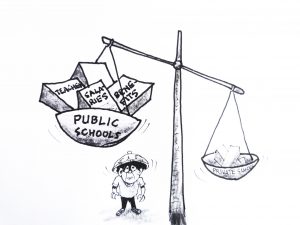As we celebrate Teachers’ Day in both private and government institutions, there is an underlying issue that often goes unaddressed: the disparity in how teachers are treated, appreciated, and supported in these sectors. While government teachers enjoy national recognition, job security, and standardized benefits, many private school teachers struggle with job precarity, lower salaries, and less visibility. The imbalance needs to be confronted for fairness and the future of education in the country.
Government teachers are undeniably the backbone of our public education system. They benefit from state-sponsored recognition, salary adjustments, and additional perks like tenure. Public institutions usually host grand celebrations during Teachers’ Day, with government officials lauding their dedication. This system of support allows them to continue serving despite the challenges of overcrowded classrooms, limited resources, and bureaucratic red tape. However, the robust backing they receive highlights the gap between their experience and that of private school teachers.
Private school teachers, on the other hand, often face more challenges with less support. While they also dedicate themselves to the education of our youth, many do so under more financially constrained conditions, with lower wages and less job security. Teachers’ Day is celebrated in these institutions, but the recognition often remains limited within the school itself. The sacrifices of these educators, who are crucial to the success of the private sector, deserve more visibility and acknowledgment on a national scale.
The issue at hand is not just about celebrating Teachers’ Day but about the systemic inequalities that exist between the two sectors. We must ask ourselves: how can we, as a society, claim to value education when the teachers in one sector are left behind? This disparity is not just an issue of pay but one of respect and validation. We need to elevate private school teachers to the same level of acknowledgment as their counterparts in government institutions.
Moving forward, the government and the public must work toward bridging this gap. Teachers’ Day should not only be about festivities; it should be a time to reflect on what more can be done for all educators. The government, through policies and recognition programs, must ensure that private school teachers receive similar benefits and protections. We need to create a more equitable environment where all teachers, regardless of where they work, are equally celebrated and supported in their noble profession.




